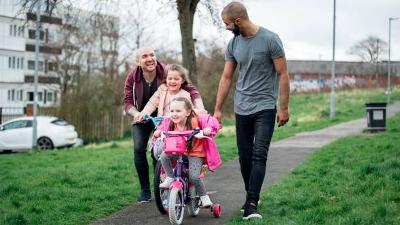What is fostering?
When a child can't live at home or with a close relative or family friend, they become a child who is cared for by the local authority. Foster parents provide children with a safe home on a short-term or longer-term basis.

Coming into care is hard, whatever the circumstances. Foster carers provide children in care with safety, stability and a nurturing home environment where they can be given the best opportunity to flourish. Older children can also benefit from living with a foster family who support them with learning life skills as they become an adult.
In the East of England, we need at least 300 more foster families so we can match the children who come into care with the best local foster family for them.

What does 'looked after child' mean?
All children in care are the responsibility of their local council. When a child comes into care they are known as a 'looked after child.'
Experienced social workers find a suitable foster home with local authority foster carers, or with foster carers who work for an independent fostering agency. Fostering with your council is a direct relationship. Our social workers really get to know you, so the best matches can be made between you and the children in our care.
What is a foster carer?
Foster parents look after children in their home. You'll make sure they get washed and dressed and have clean clothes to wear, eat well, get to school or college, do their homework, have time to play or relax and do the things they love doing, all in a safe, nurturing environment where they feel loved and part of family life.
You will give a child or children stability and consistency in your home and be a positive role model, working to improve the lives of the children and young people who come to live with you.
Almost anyone over the age of 21 can be a foster carer. You'll be patient, kind, and motivated to make a difference to a child's life. Good communication skills are key, together with plenty of energy. Some experience of looking after or working with children is beneficial, but it is not essential. Aunties or uncles who don't have children of their own can make great foster carers. There are a variety of fostering roles which can fit around you and your family and the age range of children or young people you're most suited to foster.
What do foster carers do?
Children have different routines based on whether it's a school day, the weekend or the school holidays. Depending on if you foster short-term or long-term, at weekends or in the school holidays, your daily activities could include:
- Keeping a warm, clean, safe home and involving children in family life
- Making nutritious meals
- Helping younger children to get washed and dressed, teaching self-care to older children
- Helping older children with homework
- Dropping off and picking up children from school
- Taking children to after-school or weekend activities
- Having fun and enjoying time together, ensuring children have the opportunity to play, relax, and lead a healthy lifestyle
- Communicating with nursery, school, college and other organisations and with social services contacts
- Taking children to medical appointments and to keeping in touch visits with their family members
Foster carers are an important role model, offering love, help, patience and kindness to children who may struggle to place their trust in adults. Foster parents receive extensive training to help them prepare for their role, and to care for the children that come to live with them.
Foster carers are approved following a thorough assessment process that takes around 4-6 months.
Could you be a foster parent?
Call our friendly team today to find out more. Call Foster East on 0330 024 1177 or fill in our online enquiry form. We're open 8am to 8pm daily and would love to talk.




